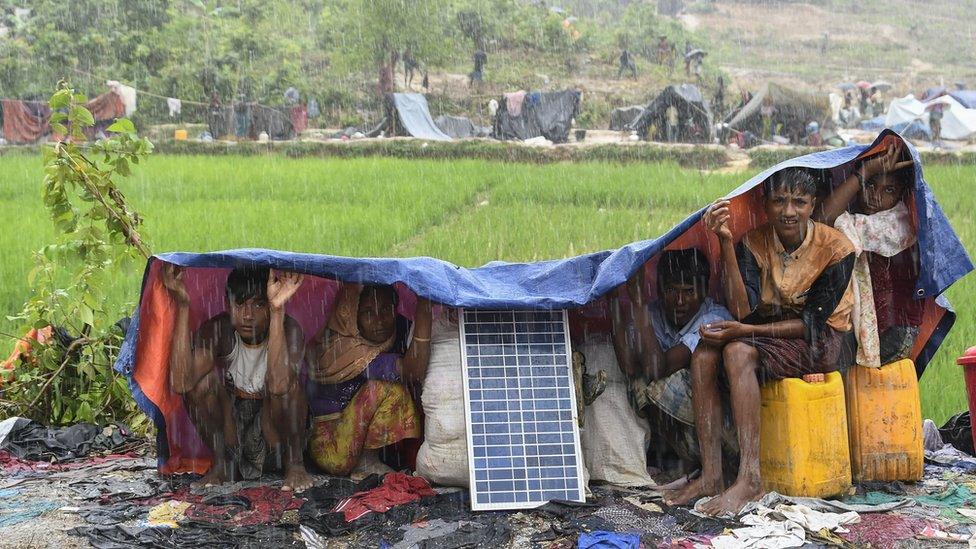MPs' 'grave concern' about returning Rohingya people
- Published

Thousands of Rohingya have been forced to live in camps
MPs have raised "grave concern" about the plight of thousands of Rohingya people being returned to Myanmar.
The Commons International Development Committee said it was "clear" that rape and sexual violence remain weapons of war used by the Burmese military.
And it warned of the "chilling prospect" of the area becoming a "powder keg of radicalisation".
The Rohingya are a stateless minority who have long experienced persecution in Myanmar, also known as Burma.
More than 650,000 have fled to neighbouring Bangladesh since deadly Rohingya attacks on police posts prompted a military crackdown in Rakhine state in late August.
The crisis has been called ethnic cleansing by the UN and the US.
Myanmar's military has denied targeting civilians, and insists it is fighting only Rohingya militants.
In a new report, the International Development Committee said a "huge human tragedy" had unfolded.
"Burma's actions have imposed human suffering on hundreds of thousands of people and presented the world with a huge bill for humanitarian relief estimated to amount to a billion pounds per year," it said.
"There is also the chilling prospect of yet another long-term, politically intractable, cross-border displacement where the prospects of it becoming a powder keg of radicalisation seem very real."
It welcomed the UK government's "five-point plan" for the international community to tackle the crisis.
This involves ending violence by the Burmese security forces, securing full humanitarian access, allowing refugees to return in a "voluntary, safe and dignified manner", implementing the recommendations of a report by former UN chief Kofi Annan, and full access and co-operation with the UN's fact-finding mission.
"However, our evidence indicates there is little by way of international consensus and activity behind the plan," the MPs said, warning of "substantial challenges" in each part of the list.
"It strikes the right notes but the conditions needed to underpin each strand appear to be out of reach in the current circumstances," they said.
The report said Bangladesh was "proceeding apace" with the return of a first tranche of Rohingya.
"We recognise that traditional leadership structures across the displaced Rohingya communities have been massively disrupted, but the lack of evidence of consultation or involvement of the Rohingya concerns us," it warned.
"There are previous episodes of displacement and return of the Rohingya, and other ethnic minorities, in Burma over the last 20 years which do not inspire confidence."
UK medics have been sent to vaccinate Rohingya against diphtheria
It was unclear whether the reported list of 100,000 Rohingya are volunteers, what their final destination is and how they will be protected, the MPs said.
"As it stands, this is a matter of grave concern to us."
Long term, the report said there was a need to find ways for the Rohingya people to "develop livelihoods and become more self-reliant".
It praised the UK government for "committing to a substantial sum" - £59 million - at an early stage, acknowledging that the UK was "one player within a complex multilateral environment".
Committee chairman Stephen Twigg said: "We are going to have to work much harder to protect populations from threats and humanitarian crises.
"For decades, the Rohingya people in Rakhine State endured discrimination, marginalisation and abuse. The Rohingya have paid a heavy price for the lack of consensus amongst the international community on how and when to decide to act effectively. We cannot fail them again."